domestic Services
The Ultimate Hot water heater guide
Our expert Home Advisor can help you choose the right boiler for your home and family
Our expert Home Advisor can help you choose the right boiler for your home and family
Our expert Home Advisor can help you choose the right boiler for your home and family
heater Types
or Replace
accessories
maintenanace
asked question
energy
The cost of heating water consumes almost 20 percent of your household budget, second only to what you spend on heating and cooling your home. Despite this expense, water heaters are typically ignored until they break, leaving you with no hot water
Some homeowners may be unclear on the difference between a boiler and a hot water cylinder. There is some crossover in the function boilers and hot water cylinder perform, but these two appliances are not the same. Both appliances heat the water you and your family use, but boilers also provide heat for your home, while hot water cylinder do not. We’ll explain the difference in more detail and discuss both of these home appliances so you understand what’s working behind the scenes to heat your water or, in the case of boilers, to heat your water and your home.
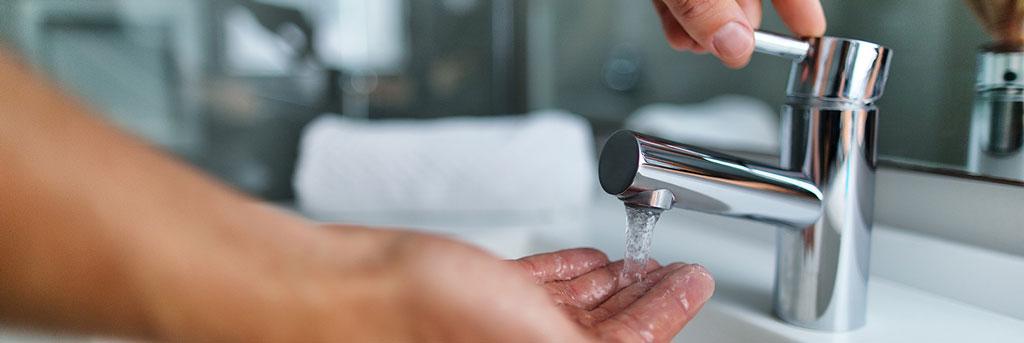
Take the Guesswork out of Your home hot water solution with Pace A trusted leader in the home service industry, we make easy to keep your home comfortable, with the latest hot water systems. including the Megaflo, Heatrae Sadia unvented cylinder, Vaillant, Baxi boilers and more.
Take the Guesswork out of Your home hot water solution with Pace A trusted leader in the home service industry, we make easy to keep your home comfortable, with the latest hot water systems. including the Megaflo, Heatrae Sadia unvented cylinder, Vaillant, Baxi boilers and more.
Pace Heating & Plumbing is dedicated to bringing peace of mind to you year-round. All our engineers are gas safe registered. Call 0207-183-2727 if you are not ready to talk now fill out your contact information and a dedicated Home Advisor and Business Account Managers will work with you to customize a solution for your business or home and family needs
The process of finding the right hot water heater equipment for your home can often feel like an overwhelming task. There are a variety of options to consider and, depending on the needs of your home, there are different features available to customize your equipment for optimal comfort.
To help you navigate through this complex buying decision, below are some details about the various options and answers to common questions about home hot water heater.
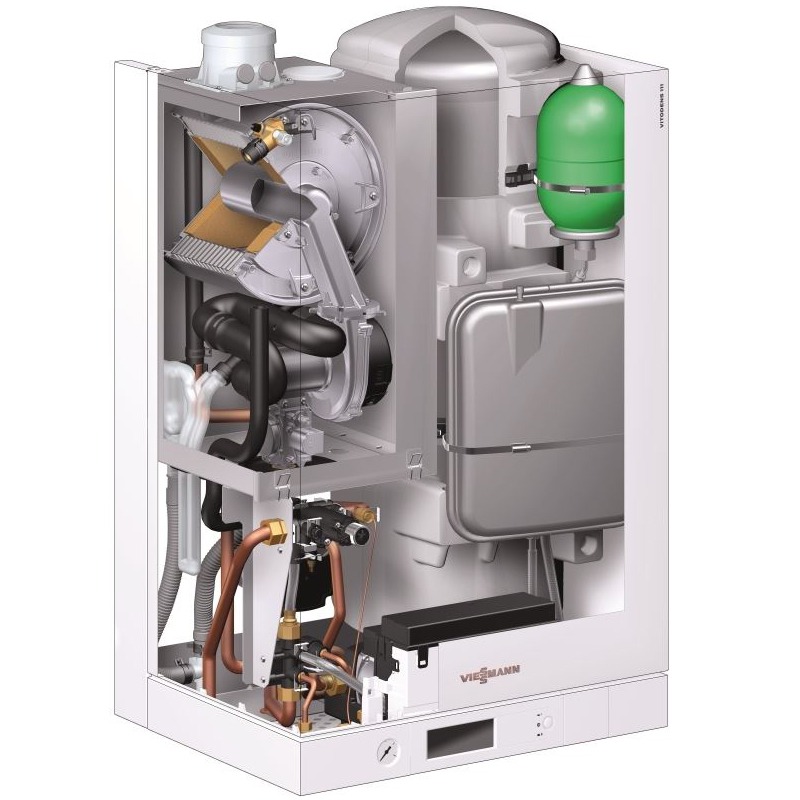
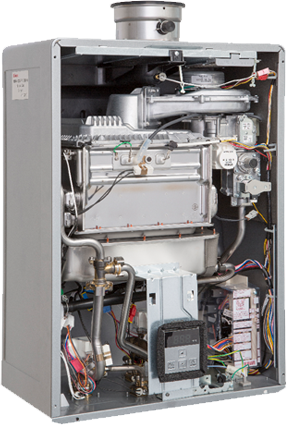
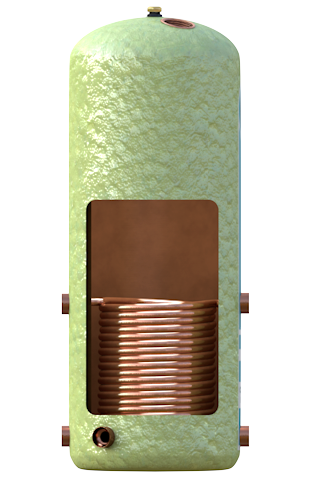
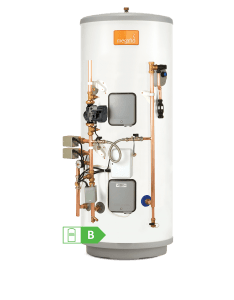
If you are looking to have a new boiler installed, there are different options and features available to customize hot water solutions according to your needs. We will review different types of boiler, available features, options and how a boiler works.
To tailor a solution to your home, we recommend having a Pace Home Advisor assess your needs and recommend what is best for you and your home. Learn more about booking an expert in-home consultation click here.
Let’s start by explaining what a boiler is and the purpose it serves. A boiler provides both hot water and heating for a commercial building or domestic home. Focusing on the domestic side, that means when you have a boiler, the hot water for your shower, your dishwasher, washing machine and more come from the same source that provides heat for your whole home.
That brings us to one of the major differences between a boiler and a hot water cylinder. With a hot water cylinder, you would need another means of heating your home, such as a boiler. A boiler not only heats water for use in appliances and showers throughout your home, but uses hot water to warm up your home whenever you turn on the heat during cold months.
Typically, the heat comes through either radiators or underfloor systems. Though the name “boiler” suggests the water is boiling, most domestic boilers do not get the water this hot.
Let’s take a look at some different types of boilers you’ll see on the market today.
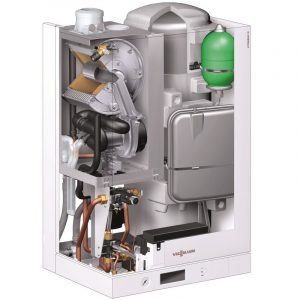 A combi boiler, also known as a combination boiler, is highly efficient and compact, making them ideal for smaller homes. The name combi refers to the fact that these boilers are able to act as both a water heater and also a central heating unit.
A combi boiler, also known as a combination boiler, is highly efficient and compact, making them ideal for smaller homes. The name combi refers to the fact that these boilers are able to act as both a water heater and also a central heating unit.
Thanks to their space saving features, combi boilers are one of the most popular choices in the UK – accounting for over half of domestic boiler installations each year.
Combi boilers work by heating water directly from the mains, so you don’t need a hot water storage cylinder or cold water tank. While combi boilers have some great advantages, there are also considerations you should make before going ahead with an installation.
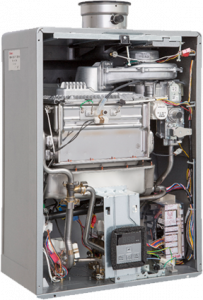 A gas multipoint water heater is a gas fired water heater that heats domestic hot water instantaneously to multiple points around your home or building – thus the term “multipoint”. These multipoint water heaters allow you to connect the water heater to a number of hot water outlets throughout your property or home or even a commercial building.
A gas multipoint water heater is a gas fired water heater that heats domestic hot water instantaneously to multiple points around your home or building – thus the term “multipoint”. These multipoint water heaters allow you to connect the water heater to a number of hot water outlets throughout your property or home or even a commercial building.
This type of hot water system, provides a simple and proven solution for providing instantaneous domestic hot water on demand, without the need of a cylinder and a gas boiler. These gas fired water heaters, which are available in either natural gas are simple, reliable and a lot more effective than instantaneous electric water heaters, which can’t transfer the heat to the water, like a gas fired unit can.
They are also an energy saving solution to more traditional hot water storage systems, as they only heat the water when its required, saving not only energy itself, but also wasted energy costs as well. These facts have made multipoint water heaters the users water heater of choice, with great user comfort.
When you are selecting a new hot water heater boiler check to see if it is ErP Rated to make sure you are getting an energy efficient option.
When researching types of boilers, you are likely to come across the terms condensing and non-condensing boilers. These terms describe the type of technology within the boiler, i.e. how the boiler uses fuel to produce hot water for your home.
You will not have to make a choice between these types as, by law, all modern boilers now use condensing technology as standard. This is because they are more energy efficient than non-condensing boilers. While non-condensing boilers would only be able to extract between 50-80% of heat from the fuel, modern condensing boilers can typically extract 90-92% of the heat.
Condensing boilers are so much more effective because they are sealed systems meaning they extract heat from flue gases which would have otherwise been lost by a non-condensing boiler. Condensing boilers were not overly popular when they first hit the market, with early teething problems and a collection of myths about their reliability putting many homeowners off. Since then condensing boilers have come a long way and many of those old issues have been resolved.
The ErP Rating is a requirement set by the European Union which is designed to drive improvements in the efficiency and performance of heating and hot water products. The ErP rating introduces new efficiency classes from A++ to G which are displayed on a labels which come with the boiler. ErP labels are already a common sight on washing machines, televisions and other appliances within electrical retailers.
A boiler installed in a garage or loft is at higher risk of freezing than a unit installed in a kitchen or utility room. Boilers have water within them that is susceptible to freezing in cold conditions and if this happens the boiler is likely to breakdown. To combat this, modern boilers have a frost protection feature that sees the boiler turn on if the temperature of the water drops to a certain level, heating it up until the risk of freezing has been prevented.
Having an efficient heating system running on a low carbon fuel is one of the most important steps you can take to reduce your fuel bills and your carbon dioxide emissions.
Back to top
If you live within the M25, the type of fuel your boiler will use will be restricted to gas or, electricity but some homeowners may find they have a choice.
Gas is the most common heating fuel type in the UK and the majority of homeowners who are connected to the gas grid opt for a gas boiler.
Cheaper to run than electric boilers: Gas is around 3-4 times cheaper than electricity per kWh making it a much more economical option when it comes to heating your home. Whilst a gas boiler is not 100% efficient (and an electric radiator is), you can still get more heat for your money from gas.
Gas is the cleanest fossil fuel: Whilst gas is a fossil fuel and therefore not environmentally friendly, it is the cleanest fossil fuel of those available. In fact, gas creates less than half of the CO2 emissions of oil, and a third of those produced by coal.
You must be connected to the gas grid: In order to power a boiler with natural gas you must be connected to the gas network. It can be extremely costly to have your property connected to the grid if it is not already, so if this is the case you may want to opt for a different fuel type.
An electric central heating boiler is a great option for anyone looking for a compact boiler for a smaller household. They are also a good alternative for homes that cannot install a gas boiler since they are not connected to a gas line.
A typical electric boiler will work by heating the water that runs through it with a heating element and this hot water is then pumped to where it is needed. Thanks to the way they heat water, electric boilers are considered one of the least wasteful options as there is extremely minimal heat loss like there is with a gas boiler.
High efficiency: An electric boiler can run at around 99% efficiency as it doesn't lose heat in the same way as a gas boiler would. Whilst this does mean that the boiler itself is more efficient, it doesn't necessarily make an electric boiler eco-friendly.
Simple, compact and often cheaper to install: Electric boilers use fairly simple technology when compared to a gas boiler. For this reason they are usually compact and in many cases cheaper to install than other boiler types, especially as there is no flue to be fitted. Since they don't use gas, there isn't the same risk present from carbon monoxide and you don't need to use a Gas Safe Registered installer.
High cost of electricity: Despite being so efficient, electric boilers can be expensive to run due to the high cost of electricity. With gas costing less than half of the price of electricity, you should consider this factor before opting for an electric boiler.
Not always ideal for large properties: An electric boiler can only heat small amounts of water at a time, and usually they cannot store it for later use. This means a larger property which uses a lot of hot water, or has multiple bathrooms being used at once may not find an electric boiler adequate.
Reliance on electricity: Since this style of boiler runs on electricity, it might not be the best option for a property that is affected by power cuts or outages on a regular basis.
Heating accounts for about 53% of what you spend in a year on energy bills, so an efficient boiler makes a big difference. All well-maintained boilers burn their fuel very efficiently, but they inevitably lose some heat in the hot gases that escape up the flue (a pipe for extracting fumes and supplying fresh air to the boiler).
Modern boilers are more efficient for several reasons, but their main advantage is that they are all condensing boilers. A condensing boiler has a larger heat exchanger, so it recovers more heat, sends cooler gases up the flue and is more efficient. Sometimes the flue gases get so cool that the water vapour in the gas condenses out, and even more energy is recovered from the condensing vapour.
In a typical gas central heating boiler there are pipes entering the boiler underneath. One is the pipe which feeds gas from the mains gas supply (which is outside your home in the street) into the boiler. Another pipe enables cold water to enter the boiler so it can be heated and another enables hot water to exit the boiler so it can be pumped around your home.
Back to top
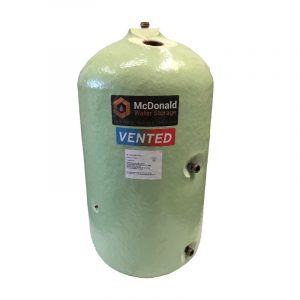 A vented hot water cylinder is a popular system you will find in many homes around the country. The vented cylinder works by storing cold water from the mains in a tank and, subsequently, it can be heated and fed to any of the appliances in your house that require it. You will often find the storage tank in the loft, though this can differ depending on the house.
A vented hot water cylinder is a popular system you will find in many homes around the country. The vented cylinder works by storing cold water from the mains in a tank and, subsequently, it can be heated and fed to any of the appliances in your house that require it. You will often find the storage tank in the loft, though this can differ depending on the house.
There are also two types of cylinders you can choose from – direct and indirect. If you use an indirect vented hot water cylinder, the water that comes through your taps will be kept separate from the water used to heat the radiators and boiler. This means you will have a cleaner water supply, though the direct option – where all the water is directly heated by the boiler – can often be a convenient option for some households.
 The majority of homes in the UK have a combi (combination) boiler. However, some homes with a higher demand for hot water (i.e. more radiators and multiple bathrooms) need an additional hot water cylinder to heat and store a higher volume of water than a combi boiler can provide.
The majority of homes in the UK have a combi (combination) boiler. However, some homes with a higher demand for hot water (i.e. more radiators and multiple bathrooms) need an additional hot water cylinder to heat and store a higher volume of water than a combi boiler can provide.
Unvented hot water cylinders have become more and more popular. An unvented cylinder takes its water supply directly from mains, so there is no need for the water tank in the attic which saves a lot of space. Another advantage is that the cylinder is supplied directly from the cold mains which delivers a higher pressure and more reliable flow of water.
If you live in a larger property with more than 10 radiators, two or more bathrooms, and lots of inhabitants, it may be better to install a system boiler with an unvented cylinder.
All heat pumps move heat rather than create it, making them one of the most energy efficient hot water heater systems
Back to top
An air source heat pump split is a compact, modern, refrigerant-based heating and cooling system. It consists of an outdoor unit and one or more indoor units, The outdoor unit sits outside on a pad or mounted on stands. heat pumps are sometimes combined with a unvented cylinder to provide home hot water
Benefits of an air source heat pump split:
Considerations of an air source heat pump split:
Geothermal systems are top of the line heating equipment. These systems are also often referred to as ground source heat pumps. Geothermal heat pumps change the temperature in your home by transferring heat between the home and the ground. during cool seasons the temperature underground is warmer that the temperature of the outside air; and during warmer months it is cooler than the outside air. Ground source temperature differentials are smaller than the air sourced differentials, allowing the heat pump to remain in a more efficient range. Geothermal systems move heat using liquid. they ground source heat pumps are sometimes combined with a unvented cylinder to provide home hot water
Benefits of a geothermal heat pump:
Considerations of a geothermal heat pump:
Solar thermal turns the sun's energy into electricity this system uses it to heat your water. This solar heated water can supply both a wet central heating system as well as your taps, baths and showers. By using the sun's energy (which is free) to heat your water you will need to use your boiler less. This means cheaper heating bills, lower carbon emissions and less strain on your boiler.
Solar thermal or solar water heating systems use the sun's heat to produce hot water for your radiators, taps and showers.
Benefits of solar thermal heating
Consideration of solar thermal heating
Beyond selecting the right hot water heater type for you and your family, there are several other things to consider to ensure your unit is the right choice for your home and budget. Here is some information about hot water heater options, installation and accessories.
Make sure to have your new hot water heater professionally sized by a Gas Safe Registered Engineer. A properly sized system will run more efficiently than an incorrectly sized unit.
Back to top
One of the most important decisions when upgrading your heating equipment is choosing whether to repair your old or replace it with a new system. Before making the decision, you will want to determine the equipment you are having installed, the total cost of ownership and the cost and effort of maintenance.
Your hot water heater plays and essential role in keeping your home comfortable as well as in some cases run your central heating radiator in the winter. When it comes time to replace your hot water heater, consider upgrading your boiler at the same time (if applicable) to help ensure you are getting the most out of your investment.
Energy Efficiency
Anytime you upgrade outdated equipment you could be investing in a more efficient system. Replacing your boiler, hot water tank and central heating radiators at the same time will help you maximize your energy savings.
Equipment performance
Since your boiler, hot water tank and central heating radiators work together, replacing just one piece could prevent the newer piece of equipment from reaching its potential performance.
Potential savings
Boiler, hot water tank and central heating radiators are often sold together as packages, so if you decide to upgrade at the same time there may be deals or discounts available. Having all pieces of equipment installed at the same time may also result in cheaper labour and installation costs.
A like-for-like hot water heater replacement is the most straightforward hot water heater installation and can be completed within one day.
Back to top
Even if you are a handy person, installing something as complex as a new hot water heater is not a good idea. A gas safe registered professional engineer brings experience and updated knowledge of gas code requirements, modern electronics and new technologies. Unless you are a certified gas safe registered engineer, a self-installed hot water heater could lead to a poorly operating, unsafe system.
Depending on the system that you are having installed, a hot water heater installation can take anywhere from a half-day to three day to be properly installed. This includes the installation, testing and clean up.
Most hot water heater installations will be done by two professionally trained gas safe registered engineers. A good installation team will come on time and prepared with all the parts necessary to get the job done. The engineers should also be wearing booties over their shoes to protect your home, rolling out additional carpet and floor protection where needed.
The hot water heater installation itself can take a few hours and once it has been installed, the team will fire it up and conduct tests to make sure it is working properly and in sync with your other systems. Then they clean up completely, removing the old hot water heater, all parts and packaging.
Before the installation, you should ensure the room where old hot water heater is installed and any other work areas are clean, clutter-free and well lit. For everyone’s safety, keep children and pets away from the work area.
Once your new hot water heater has been installed, the heating engineer will take you through how to use the controls. Taking the time to hear about the features of the hot water heater will help you to use your new hot water system efficiently. Before leaving the heating engineer will provide you with a Building Regulations Compliance certificate which confirms the unit has been installed safely.
With the installation complete, it’s time to register the installation with the manufacturer to validate the warranty. Most manufacturers request that this happens within 30 days of installation.
There’s no right or wrong time to have your hot water heater serviced – as long as it’s being serviced once every 12 months. While you can have your hot water heater serviced at any time of year, we highly recommend arranging one during the summer.
Back to top
To keep your warranty valid you will need to have your hot water heater serviced annually. A hot water heater service involves a heating engineer inspecting the hot water heater inside and out, checking the flue pipe, (if applicable) ensuring that the gas pressure is correct and how the hot water heater performs during operation.
Not only will an annual hot water heater service keep your warranty valid, they will also ensure that your hot water heater is performing safely and to its full potential in terms of efficiency and reliability. Plus, it could bring a potential issue to the attention of a heating engineer before it turns into a fault and you need to pay for a repair.
Annual hot water heater services ensure that your hot water heater is able to provide adequate hot water for your home for as many years as possible. As hot water heater technology has developed, the warranty length offered by some manufacturers have extended. In some cases, you can get a warranty of up to 15 years so you wouldn’t need to consider a hot water heater replacement until after that warranty has come to an end.
Manual thermostats and timer are economical and simple to control but the temperature of your hot water cylinder will only be adjusted when you manually change the settings of the thermostat.
Pros:
Cons:
Programmable timer can help save on costs by adjusting the time when your hot water heater cylinder comes on automatically throughout the day. These timer are very easy to operate and can be set to meet your changing needs – such for a work week vs. weekend.
Pros:
Cons:
One of the newer trends in smart home technology are smart hot water cylinder thermostats and timer that you can control from your computer or smartphone. These thermostats and timer learn, remember and adjust to how, when and where you use your system. They can help you to save on your energy consumption by adjusting the temperature and time only when it knows you need it.
Pros
Cons:
Hot water accounts for about 20% of what you spend in a year on energy bills, so an energy efficient hot water heater makes a big difference. reduce your fuel bills and cut your household carbon footprint
Back to top
Immersion Heaters
Immersion heaters are electric heating elements that are found in hot water heater vented and unvented cylinders to heat water, acting like a kettle to heat the surrounding water in the cylinder.
Pressure & Temperature Relief Valves
Pressure and temperature relief valves are designed to provide protection against over pressurization, which can occur within an unvented hot water system if the input temperature or pressure controls fail. The valves are designed to be fitted to the upper portion of a hot water cylinder as this is where the hottest temperatures in the system will be found. If the system rises above 95°C, the wax mixture within the element of the temperature probe will expand, this will lift the valve off its seat and release water to waste, therefore reducing the pressure within the cylinder. Also if the water pressure increases (without temperature increase) the valve will stay closed until the set pressure of the relief mechanism is reached, at which point the valve will again open and the excess pressure is relieved. Under fault conditions, the pressure and temperature relief valve (P&T or T&P valve) will discharge water to prevent over temperature of the system. The drain pipework from the valve must discharge through a tundish, positioned to a safe and visible position to alert the householder of a fault condition with the unvented system and prevent damage to the property.
Expansion Vessels & Accessories
As the name implies Unvented Cylinder Systems have no vent pipes, and so when heating water have to provide room for its expansion. This can be accomplished either by accommodating it in an external expansion vessel or, in the case of bubble-top units, an internal air bubble within the unit which is generated when the system is commissioned.
Pressure Reducing Valves & Accessories
As UK Plumbing systems become more advanced and plumbing equipment’s becomes more sophisticated, mains pressure is being increasingly used in situations that used to be the domain of the low pressure gravity systems: e.g. unvented hot water heaters, multi-point and combi boiler, As the use of such systems and specialised fittings becomes more common, so too does the use of pressure reducing valves in order to control and regulate pressure and flow to the appliance.
In the UK, water pressure from the mains can vary from between 1 bar to 20 bar, and in some places at low usage times the pressure can be even higher than that. The water pressure is also variable throughout the day, with pressure increasing at night and in the middle of the day but dropping at high usage times: early in the morning and late in the afternoon. Generally, for most domestic applications a pressure of around 3 bar is sufficient if the internal plumbing system is designed and installed correctly. Water pressures above 3 bar can start to cause problems such as excessive noise from the high flow velocity, water hammer from ceramic disc taps, solenoid valves and ultimately higher water bills. One simple way to prevent these difficulties and protect the plumbing systems from over pressurisation is to install a pressure reducing valve at the entrance to the property which will limit the and maintain the incoming
Pressure Relief Valves & Accessories
Pressure relief valves, sometimes known as PRV’s, Expansion relief valves or safety valves are designed to protect unvented hot water systems from over pressure caused by failure of pressure reducing valves, failure of expansion vessels or loss of internal air bubbles in system tanks. They are a vital component of the safety mechanism on a pressurised heating system so should never be disconnected or removed unless they are to be replaced immediately and should be serviced and maintained on an annual basis.
A UK home use an average of 75 Litres of hot water each at home every day for washing dishes and clothing, cleaning and showering or bathing. Water heaters account for 19.3% of the energy used in the average home, and 5.7% of the energy used in the average commercial or institutional setting. It’s important to remember the cost of energy to operate a product over its lifetime is just as important as its purchase price.
Never forget an annual service with a Service Plan
One of the best ways to ensure that you never forget to have your boiler serviced annually is by taking out our Boiler Protection Plan. We’ll send you a reminder when your service is due and can fit around your schedule and come at a time that’s best for you.
By paying just £6 a month, you’ll be spreading the cost of a service across the year instead of paying a lump sum.
Vented hot water
Unvented Cylinder
Combi and Multi-point boiler
Can I inspect the hot water heater myself?
By all means, do a visual check around your hot water heater and change your combi boiler pressure, but unless you are a qualified Gas Safe Registered engineer, it is not safe to attempt to fully inspect your own hot water heater.
What should I do before the hot water heater inspection?
Before the engineer arrives, help ensure safety for everyone by clearing the area your hot water heater is in and the path to the equipment of any clutter or other items. Replace bulbs to ensure adequate lighting. For everyone’s safety, separate and keep your children and pets away from the work area.
When you are doing maintenance around your home, be sure to replace the batteries and test both your fire alarm and carbon monoxide detector. This should be done at least twice a year.
Back to top
There’s never a good time to need a hot water heater repair. Whether it’s a one-off repair or emergency hot water heater repair, it is important not to leave it if your hot water heater requires repair. Depending on the problem you are facing, ignoring the issue will leave you without hot water and further damage the equipment. For most problems, it is best to call a gas safe registered engineer to come and inspect and repair the system to ensure it is fixed properly.
For more information about having your hot water heater fixed, here are a few frequently asked questions for the most common hot water heater issues:
Emergency hot water heater repair
Not all hot water heater faults are considered an emergency. If your hot water heater repair falls into any of the following categories then it’s considered an emergency hot water heater repair:
The Pace gas safe registered heating engineers can respond to emergency hot water heater repairs within 24 hours.
Do not try to open or repair a hot water heater. Unless you are a qualified heating engineer, never attempt to remove the door or open the hot water heater in any way. Electronics and anything inside your hot water heater are for professionals only.
Back to top
If your hot water heater develops a fault but it’s not classed as an emergency you will need what’s known as a one off hot water heater repair.
The cost of one off hot water heater repairs can vary considerably. It could be based on the time the engineer takes to repair your broken hot water heater. In this case an engineer will usually estimate the time that will be needed and the cost of the job, but this could increase if unexpected complications arise.
Alternatively, Pace Heating & Plumbing offer a fixed price hot water heater repair. This is also known as fixed fee hot water heater repair and means the price you’re quoted won’t change, even if the job takes longer than initially planned. Parts and labour is included in this price so there are no surprises down the road.
Some hot water heater repairs are much more common than others. And a couple of them are safe enough for you to resolve yourself. However, this only includes repairs such as increasing combi boiler pressure. A heating engineer should always be hired to carry out more serious repairs.
No one wants to break the bank trying to keep their home and family comfortable. Do you know how to maintain hot water in your home kitchen, bath and shower taps to a comfortable temperature and keep bills low
Hot water heater controls are there to make sure you stay in control of your hot water heater and what you pay. It’s very tempting to turn the hot water heater dial to maximum and hope for the best, but this will also trigger a massive energy bill.
Take a look at our tips below to find out how you can take control of your hot water heater.
Smart thermostats could be your next green choice to help reduce your carbon footprint and energy bill
Smart thermostats could be your next green choice to help reduce your carbon footprint and energy bill
Back to top
If you have a hot water cylinder, you know just how beneficial it can be. you might have questions about how to get the most out of your system, such as whether or not you should use a programmer or timer on the immersion heater power supply.
The short answer is, yes, you should. Using a timer is an excellent decision that can make a significant difference in your usage experience.
Why Bother with a Timer or Programmer?
Because a hot water cylinder can provide heated, water on demand, many people wonder why they should bother with a timer or programmer. There are two primary reasons:
How Does a Timer/Programmer Affect Your Usage?
Many people would like to save money while making their homes more energy efficient, but they are concerned that using a timer or programmer will limit their access to hot water. However, that’s not really the case. While your hot water cylinder may only actively heat water during the range of hours you set, today’s water heaters are very well insulated. That means they’re capable of maintaining hot water for very long periods – even after hours without active heating, you will still have hot or very warm water at the taps.
How to Set Your Schedule?
With a timer or programmer, you can easily set a period of the day when the heater will actively warm water. To determine which times of the day are right for your home, you’ll need to do some investigating. When do most people shower? When do you usually run the dishwasher? Determine when peak demand is and then adjust your timer around those needs. You can also change your usage habits to better fit with a programmer or timer, as well.
If you are thinking of replacing your old combi or multi-point boiler fitting a condensing boiler is the way to go Modern boilers are more efficient than older boilers for several reasons, but their main advantage is that they are ‘condensing’. A condensing boiler recovers more heat from the exhaust flue gas and uses it to heat the central heating water, making it more efficient than older boilers.
Condensing boilers are the most energy efficient, typically being 25% more efficient than non-condensing models. If you still have a old-style non-condensing boiler, then replacing it with a new condensing boiler could save you £45 to £300 a year (Energy Savings Trust, 2021).
But to make sure you make the most efficient choice, you need to pick the right type of boiler for your home. Getting the wrong type can lead to unnecessarily high bills.

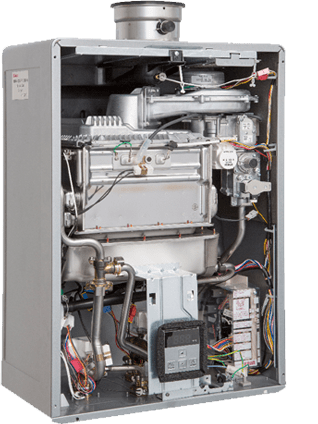
Boiler repairs could cost over £600. You could avoid most unexpected repair costs like these with our Pace boiler Protection Plans.

We’re Pace Heating & Plumbing If you’re looking for boiler engineers in your area, then you’ve come to the right place. All our engineers are trusted & accredited Gas Safe registered professionals. We only higher the best. Get in touch today!